Berserk: 1997 Anime Series review
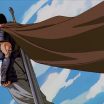
Berserk and the Band of the Hawk comes out in less than 2 weeks, so let’s talk about the grand-daddy of Berserk on video, the 1997 anime. A 25 episode series that spans the opening of the story to the Eclipse.
By now we’ve covered a lot of the important character beats and themes, so instead of any per episode breakdown, a general review…
Introduction
This series was my introduction to Berserk, and the first episode was a tremendous introduction. It wastes little time in setting the mood. It’s clear that the world has gone to hell. We see the evil of the apostles as one destroys the town. Then we see Guts in all of his hard core, die hard, determined, bad-assery. This is the episode that had me hooked. It did a superb job of establishing the world, the struggle, and the core tenets of Guts as a character. There are plenty of aspects that are not included yet, but the world of Berserk is so detailed, and Guts is such a deep character, that there’s no way to touch on everything in one episode.
Compare this to the first episode of Game of Thrones. GoT has an absurdly detailed and intricate world in its own right, and so much is introduced in the first episode that explaining it to someone can take twice as long as the run time. However, it doesn’t necessarily give you the distilled essence of the story. That would be difficult for GoT, as the story is so sprawling that there may not be a core emotional aspect to the story. However, Berserk 1997 episode 1, if you see it, and you like it, you will like Berserk.
Production
The 1997 series has been criticized for being cheaply animated. Sure, it’s no Macross Plus, and I’m not sure it’s even the original Macross, but it does what it needs to do. It’s a bit like a Roger Corman movie. You can clearly see the seams in the production, but it’s also clear that the money was spent in the right places. The soundtrack is nigh legendary. The action sequences are well animated to show the most important motions. The voice acting, or at least the English dub actors, while they aren’t the best ever, do a better job than many contemporary Anime dub voice actors. They did enough to define the characters that most of them were brought back to reprise the roles for the Golden Age movies.

The backgrounds are often great, too
There’s one more particularly notable cost saving measure, the still frames. Several seconds will be taken up by a detailed still frame. These are usually used in moments of high drama, and to emphasize certain moments. They are often inspired, or taken from, frames in the Manga. Their use doesn’t do much to detract from any surrounding action. Rather they highlight a specific moment allowing you to see it in more detail. The editing can be a bit hokey, as they tend to scroll across the screen, twice quickly, and then one more time slowly, but I still find them effective. Some examples:

Guts looks up to Griffith, overhearing his conversation, feels the distance between them 100 times greater than what we see here.

Guts manages to block the monstrous blow from Zodd.
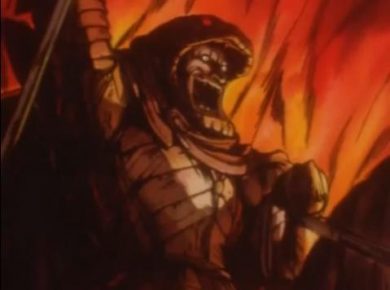
From the first episode, the Snake Baron laughs as he destroys the town, and kills civilians.
These frames let you soak in key moments without breaking the flow, and I appreciate that.
Also, in particular, the voice for the God Hand Void was great. Sounding deep and menacing, while at the same time dismissive and arrogant.
Soundtrack
I have to spend more time discussing the soundtrack. The music is not only good, but it can also speak to underlying themes of the show, or character elements that are not overt. In particular, the theme for Guts, which you would expect to be some high energy, hard driving battle anthem, is nothing of the sort. Guts’ theme is calm, even serene. Now, just because the track is called Guts’ theme doesn’t necessarily mean that it is intrinsically tied with the character, and there are moments when it is used independently of his character, but the fact that it was named after him shows that this consideration was put into it. It is used in the calm, wistful moments of the show. It speaks to the hidden depths that Guts has as a character. His overt characteristics are overtly macho, a fighter with almost Mary-Sue-esque prowess, but he is still a caring, deeply introspective, and surprisingly intelligent character.
Differences
The 1997 anime is very faithful to the source material, but because it ends at the events of the Eclipse, there are certain changes that had to be made.
Most obviously, in the Manga, Guts fights 2 apostles before the story goes back to Gutt’s youth. Without the second apostle, there’s no purpose to introduce the fairy Puck, since he would never show up again till after the eclipse, which is the end of the show. Without Puck, the world is even darker, as he’s used for comic relief in the Manga. Puck even overtly said in the Manga that without him, the story would be too dark.
Perhaps to balance out the absence of Puck’s lightening influence, some of the trauma Guts went through was cut out.
The sequence where Guts was raped was omitted from the anime.
While leaving this out does mean it’s a bit out of nowhere when Guts insists that people don’t touch him, it still sorta works to convey that Guts just doesn’t like people and wants to be a loner. So, while the development of his relationships, and particularly those with Griffith and Caska, are diminished because of this omission, it’s not too bad.
Finally, there is the apostle Wyld, who is the first apostle, other than possibly Zodd (I’m not convinced he’s an apostle), that Guts encounters. This happens after the war, and after the rescue of Griffith. Removing this character is a good thing for the anime, though. The encounter would have broken the flow of the story in the episodic format of the show. Furthermore, it would have reduced the horror of the Eclipse to see a monster before then, other than Zodd. On top of that, I think even in the Manga, Wyald was not presented correctly. The fight with Wyald was the first time that Casca seemed to be helpless, and victimized for being a woman, having to be saved by Guts. It didn’t fit with the badass who had been holding the Band of the Hawk together through force of will for months, like a female Guts who was also an effective company commander. No, here she was quickly neutralized, and victimized. After the events of the eclipse, the calculus of how to present her character completely change, but to do this before that diminishes her for no purpose.
Comparison
The 1997 Berserk anime is tremendous. It doesn’t have any of the pacing or establishing problems that the 2016 series has. It doesn’t have to rush through as much as the Golden Age Arc movies do. Those two have higher production values in general, but the mix of CG elements can be jarring at times. The 1997 Anime, on the other hand, is uniform in its presentation. While not as vibrant, most of the story takes place in locations that should be dominated by dull colors, such as encampments, or forts. The splendor of the palace and the courts are sacrificed, but that only adds up to a few minutes of the story. The fights aren’t as frenetic, or sweeping as in the later movies or series, but the framing and emphasis is often superior. For a direct comparison, watch the duel between Bazuso in the 1997 anime and the Golden Age movie, particularly the final moments.
1997:
Golden Age Movie (best clip I could find)
The Golden Age Movie has much more dynamic motion and intricate choreography, but the critical shot, the axe breaking on Guts’ helmet, is so much clearer in the 1997 anime. And that is perhaps the best single point of comparison among all of these versions so far. The 1997 Anime puts all of its resources to those moments where they are most needed.
Final Thoughts
If it wasn’t clear yet, I highly recommend the 1997 anime. It’s not perfect, but it’s very faithful to the source, and it does a good job of only exposing the seams in unimportant areas. The ending seems abrupt, but by the end it answers most of the questions the first episode raises, like “what happened to his arm?”, and “where did this demon come from?”. If you had never seen it before, you would already know that this isn’t the end of the story, and if you get hooked like I did, you’ll search out the rest of the story, and find the Manga. The 1997 series tells what it needs to tell.
Now, I will leave you with Void’s speech that speaks to some of the core themes of Berserk, destiny, fate, and free will.
This is a piece in an ongoing Berserk analysis series. See the others:



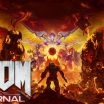

![[PROTOTYPE]](http://www.enthusiacs.com/wp-content/uploads/2020/03/title-104x104.jpg)
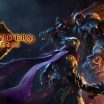
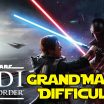
I really don’t like how they splice CG in with the later installments. I agree that the 1997 anime just looks better, despite having less production value.
Also why don’t you think Zodd is an apostle?
Zodd seems too independant, not controlled by his own lusts in the same way. He can respect humans, not disregarding them so off handedly. He even aided Guts in his duel with General Bascogn. That adds up to me to someone who hasn’t sacrificed their own humanity to attain his state of being.
Add to that we know he’s been alive for 300 years at least. We haven’t seen anything that shows the apostles live longer than a normal human. Wyld was an old man who became rejuvinated in the manga, but other than that there’s nothing to show an unnaturally extended life span that Zodd has shown.
Finally, when he sees the Behelit, he refers to the god hand as “they”. That seems an overly familiar term for an apostle. They tend to have more reverence for the god hand. “That’s their play”. Almost as though he’s a witness, not really a participant. If he is an apostle, he is certainly different.
Sure, he served as a mount for a reborn Griffith, but he also served as a mount for Guts when they fought Ganishka. That’s not a move that I could see ANY other apostle making. All in all he looks more like a peer to Skull Knight than an apostle.
Sorry for the late reply! Wish there was some kind of notification system for this.
I dunno, I still think Zodd’s an apostle. He may have been around 300 years, but there’s also nothing that shows Apostles can’t live longer than the average human naturally either. Even if they only had a human life span (which I think they don’t and live much longer), I don’t see why they couldn’t use the Behelit again like the Count did.
Zodd I think is just that different of a guy, and can afford to be that way because of the one law of the Apostles, which is doing whatever the hell they please. Just as Wyald was willing to try and trigger the Eclipse early by threatening Griffith, Zodd can take umbrage to this act and break him in half, or work together with a sworn enemy of the Godhand and be a mount to tackle Ganishka.
It’s entirely possible, even probable, that Zodd is in fact an apostle. As their law is, “Do as you will”, implying that they are free from the causality or fate that supposedly ensnares and preordains all actions of all humans.
Perhaps we should see if we can get Judge Greg in for a Berserk hero talk, or we could have a different type of BTL Radio. There’s a lot of material here to discuss.